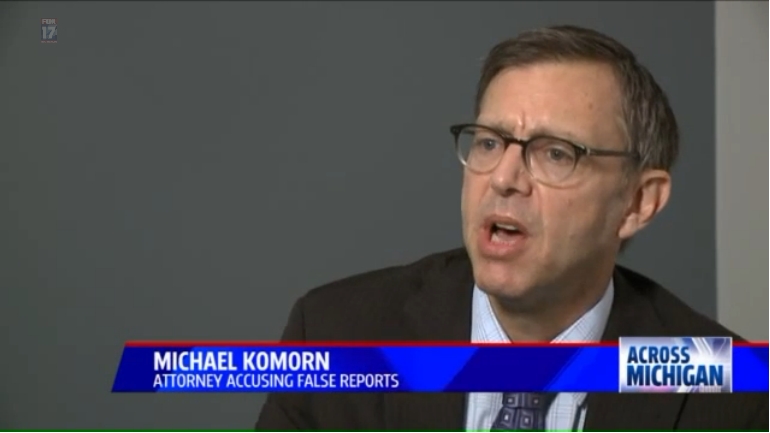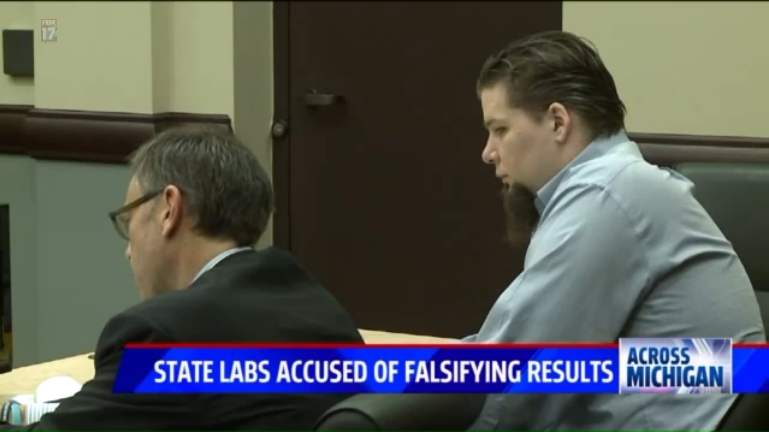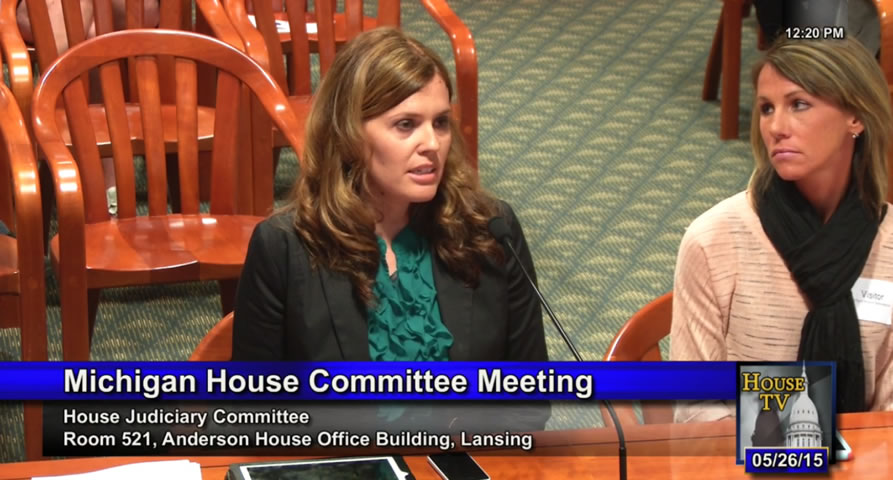
Feb 17, 2016 | Blog, Criminal Defense Attorney Michael Komorn, News
The Criminal Defense Attorney of Michigan’s Award Committee has selected Michael J. Komorn as the recipient of their Right to Counsel Award. This award recognizes the amazing contributions of a group or individual in the form of legal representation or other extraordinary service.
Komorn will be recognized at CDAM’s Annual Dinner and Awards Banquet, Friday, March 11, 2016, at the Troy, Marriott. The Cocktail Reception begins at 6:15 with dinner at 7:00p.m. For those interested in attending, visit www.CDAMonline.org and click Registration Annual Awards Dinner Tickets ONLY. For those wishing to attend the CDAM Spring Conference AND dinner, click on 2016 Spring Conference Registration OPEN. This link will allow your to register for the conference and dinner. Tickets are $65 per person
Said CDAM President Patricia A. Maceroni, “CDAM is delighted to recognize Michael Komorn for his extraordinary work in uncovering testing irregularities at the Michigan State Police Forensic Crime Lab while representing his client, Max Lorincz, pro bono.”
While defending Lorincz, Komorn obtained emails through the Freedom of Information Act uncovering recent changes in Crime Lab policies. These policies allowed for the reporting of marijuana abstract residue as “origin unknown” allowing prosecutors to charge someone with having synthetic THC, a felony, rather than marijuana, a two year misdemeanor.
Said Komorn during a recent interview with Michigan Radio, “The lab specifically changed their policy to report these things in a way that they could arrest patients or caregivers, instead of honoring the protections of the Michigan Medical Marijuana Act.”
In January 2016, Komorn was successful in getting Max Lorincz’ two year felony charge dismissed.
For more information, contact CDAM at (517) 579-0533.

Dec 10, 2015 | Blog, Marijuana Criminal Defense Attorney Michael Komorn, Medical Marijuana, Medical Marijuana Attorney Michael Komorn, Michigan Medical Marijuana Act, News
THE MICHIGAN STATE POLICE Forensic Science Division finds itself embroiled in scandal as newly released emails paint a picture of a crime lab in turmoil over how to classify marijuana. Attorneys and medical marijuana advocates accuse Michigan prosecutors of pressuring the state’s crime lab to falsely classify the origins of THC found in hash oils and marijuana edibles as “origin unknown.”
Prosecutors exploited the ambiguity to charge medical marijuana users for possession of synthetic THC, despite the fact that the personal use of medical marijuana has been legal in Michigan since it was approved by voters in 2008. Under Michigan law, possession of synthetic THC constitutes a felony, whereas possession of marijuana and its derivatives by someone who is not a licensed medical marijuana user is a misdemeanor.
The emails were obtained by Michael Komorn, lead lawyer for Max Lorincz, a medical marijuana patient who lost custody of his child and now faces felony charges after the lab’s misleading classification of hash oil found in his home.
“I’d never seen a lab report reporting origin unknown,” Komorn told The Intercept. “What was produced for us was the most unbelievable set of documents I’ve ever seen.”
The emails show that as Michigan forensic scientists debated how to classify oil and wax produced from marijuana plants, they were pressured by police and prosecutors to classify the products in a way that would facilitate harsher drug convictions.
“It is highly doubtful,” a forensic scientist named Scott Penabaker wrote in May 2013, “that any of these Med. Mari. products we are seeing have THC that was synthesized. This would be completely impractical.” And in February 2014, the supervisor of Lansing, Michigan’s controlled substances unit, Bradley Choate, wrote that a misleading identification of THC “could lead to the wrong charge of possession of synthetic THC and the ultimate wrongful conviction of an individual.” Lab inspector John Bowen, referring to the THC in edibles and oils, agreed: “Is it likely that someone went to the trouble to manufacture THC and two other cannabinoids, mix them up, and bake them into a pan of brownies? Of course not.”
Despite the unlikelihood that Lorincz and others were somehow cooking up synthetic THC, Andy Fias, a state police lieutenant with West Michigan’s regional drug task force, reached out to the Forensic Science Division in January 2015. “We are encountering a significant amount of THC wax and oil,” he wrote. “If we were to seized [sic] the wax/oil from a card carrying patient or caregiver and it comes back as marijuana, we will not have PC [probable cause] for the arrests.”
Fias had heard that lab analysts were classifying some oil as marijuana rather than THC. He asked: “Is there a way to get this changed? Our prosecutors are willing to argue that one speck of marijuana does not turn the larger quantity of oil/wax into marijuana.”
That aggressive — and intellectually dishonest — prosecutorial mindset explains what happened to Lorincz last year.
On September 24, 2014, Lorincz called 911 from his Spring Lake, Michigan, home when his wife experienced an emergency. “The paramedics came in to assist my wife, and while they were assisting my wife the sheriff came in from the outside,” the 35-year-old father told me. It was then that the officer discovered hash oil on the kitchen counter. “The whole thing is ridiculous,” said Lorincz, who at the time possessed a Michigan medical marijuana card. “I didn’t commit any crime.”
Authorities didn’t see it that way.
The Ottawa County Prosecuting Attorney’s office, led by Ronald Frantz, charged Lorincz with misdemeanor marijuana possession. Instead of pleading guilty, he fought the charge on the grounds that his medical marijuana card allowed him to legally possess the hash. Prosecutors responded in February by charging Lorincz with possession of synthetic THC, a felony.
Because the crime lab claimed to be unable to determine the origin of the THC in the hash oil, prosecutors were able to allege that Lorincz’s oil was not made from marijuana.
Jeff Frazier, a former ACLU attorney who is also working on Lorincz’s case, accuses the state’s prosecutors of circumventing the medical marijuana law passed in 2008 because of their intense opposition to marijuana.
“The lab is intentionally reporting nonexistent felonies,” said Frazier, “and the prosecutors are going after medical marijuana patients with these lab reports that are fraudulent.”
Activists believe that Michigan Attorney General Bill Schuette may be behind the pressure on the crime lab. In 2008 Schuette led the opposition to the successful initiative. “He’s been opposed to medical marijuana since the get-go and has used his office to circumvent the law,” said Charmie Gholson, a drug policy reform advocate based in Michigan.
Gregoire Michaud, director of Michigan’s Forensic Science Division, wrote in a July 2013 email that “In my meeting with PAAM [Prosecuting Attorneys Association of Michigan] it was decided that any questions regarding law interpretation (e.g., recent controlled substance cases) will be directed thru the applicable Technical Director who will then reach out to Mr. Ken Stecker.”
Kenneth Stecker, an official with PAAM, stridently opposes medical marijuana usage and in a 2012 speech said, “I literally every night look at websites, blogs, everything for two to three hours dealing with the medical marijuana issue.” At the time, Stecker said that he had given “over 150, 200 presentations” on the “hornet’s nest” of medical marijuana.
A December 2013 email quotes Stecker as saying, “THC is a schedule 1 drug regardless of where it comes from.” He neglected to mention that penalties for possession very much depend on where it comes from.
John Collins, a former director of the Forensic Science Division, told Fox 17 television, which first reported Lorincz’s case earlier this year, that prosecutors were playing politics with science. “In my experience, it was just a nonstop political game that really got frustrating, and it wore down the morale of our staff, and it quite honestly, it wore me down.”
“It was really a big deal for me to let people understand that our laboratories were not in the prosecution business, they’re not in the conviction business, they’re in the science business,” Collins told Fox 17. “And if we don’t position ourselves as being in the science business, then we really start to go down a path that’s going to lead us to a lot of trouble.”
The Michigan State Police provided the following statement:
The ultimate decision on what to charge an individual with rests with the prosecutor. The role of the laboratory is to determine whether marihuana or THC are present. Michigan State Police laboratory policy was changed to include the statement “origin unknown” when it is not possible to determine if THC originates from a plant (marihuana) or synthetic means. This change makes it clear that the source of the THC should not be assumed from the lab results.
Bill Schuette and Ronald Frantz did not respond to requests for comment. Kenneth Stecker declined to comment.
Meanwhile, Max Lorincz’s life remains in limbo, and his 6-year-old son is in foster care. Currently, he gets a few hours per week of visitation, but father and son have been apart for over a year now.
“It’s been the worst year of me and my wife’s life,” Lorincz said. “You’re talking about taking away an entire year of bonding with our son. It’s something we can never get back.”
This isn’t the first time conviction-hungry Michigan prosecutors have destroyed the lives of medical marijuana users.
In 2014, prosecutors charged Kent County sheriff’s sergeant Timothy Bernhardt with running a drug house because he received and distributed marijuana butter. Bernhardt was a licensed medical marijuana patient but not a licensed caregiver and thus was not permitted to distribute the drug to other users.
In a lab report from Bernhardt’s case, the crime lab classified Bernhardt’s marijuana butter as THC and investigators claimed to be unable to identify its origin. Armed with that report, prosecutors in Kent County went after Bernhardt with full force. Bernhardt eventually pleaded guilty to the drug house charge and was forced to resign after 22 years with the department, even though the butter was being used for medical purposes. He faced up to two years in prison, but a month before the sentencing hearing he killed himself.
“They killed him,” said Gholson. “They have blood on their hands.”
Just days before Bernhardt’s suicide, a Kent County prosecutor named Tim McMorrow told a state court that Michigan voters, despite their overwhelming approval of medical marijuana, do not have the final say. “The voters do not have a right to adopt anything they want,” McMorrrow said. “Something doesn’t become valid because the voters voted for it.”
Article By – Juan Thompson – Nov. 14 2015, 8:43 a.m.
Wikipedia
https://en.wikipedia.org/wiki/The_Intercept
The Intercept is an online publication launched in February 2014 by First Look Media, the news organization created and funded by eBay founder Pierre Omidyar.[2]
Glenn Greenwald, Laura Poitras, and Jeremy Scahill are the editors. The magazine serves as a platform to report on the documents released by Edward Snowden in the short term, and to “produce fearless, adversarial journalism across a wide range of issues” in the long term
“A primary function of The Intercept is to insist upon and defend our press freedoms from those who wish to infringe them. We are determined to move forward with what we believe is essential reporting in the public interest and with a commitment to the ideal that a truly free and independent press is a vital component of any healthy democratic society. […] Our focus in this very initial stage will be overwhelmingly on the NSA story. We will use all forms of digital media for our reporting. We will publish original source documents on which our reporting is based. We will have reporters in Washington covering reactions to these revelations and the ongoing reform efforts. We will provide commentary from our journalists, including the return of Glenn Greenwald’s regular column. We will engage with our readers in the comment section. We will host outside experts to write op-eds and contribute news items.
Our longer-term mission is to provide aggressive and independent adversarial journalism across a wide range of issues, from secrecy, criminal and civil justice abuses and civil liberties violations to media conduct, societal inequality and all forms of financial and political corruption. The editorial independence of our journalists will be guaranteed, and they will be encouraged to pursue their journalistic passion, areas of interest, and unique voices.
We believe the prime value of journalism is that it imposes transparency, and thus accountability, on those who wield the greatest governmental and corporate power. Our journalists will be not only permitted, but encouraged, to pursue stories without regard to whom they might alienate.”

Dec 8, 2015 | Blog, Michigan Medical Marijuana Criminal Defense, Michigan Medical Marijuana Criminal Defense Attorney Michael Komorn, News
An attorney probed for medical marijuana defenses as a hearing began Friday for a Hudson man charged with illegally growing and selling marijuana this fall.
Paul Alan Williams, 55, rejected a plea bargain offer before a preliminary examination on four felony charges got under way in Lenawee County District Court. The hearing is set to continue Tuesday, Dec. 8, with cross examination of a Michigan State Police trooper in charge of the investigation.
Williams was arrested Oct. 22 when search warrants were executed at a building on Meridian Road in Hudson, another in Rollin and at a house on Rome Road where Williams was believed to have been living.
Police seized nearly 21 pounds of marijuana and 9 grams of hashish from the building at 553 S. Meridian Road in Hudson where Williams was arrested, said Trooper Craig Whittemore.
At the building in Rollin, he said, police found 34 marijuana plants and processed marijuana weighing 91.5 ounces, and 19 grams of hashish oil. Another 7.2 pounds of marijuana were swept up from a trailer and pickup bed at the scene, he said.
Cash, vehicles and guns were also reported seized during the searches.
No marijuana was found at the home on Rome Road.
Whittemore testified the investigation was based on tips that Williams was selling marijuana to people without being their registered medical marijuana caregiver.
A confidential informant made three trips to the building in Hudson under police surveillance to make controlled buys, he said. On Sept. 2, the informant bought 8 ounces with $800 supplied from a Michigan State Police fund. On Sept. 16 another 12 ounces were purchased with $1,200. And on Oct. 21, 16 ounces were purchased with $1,600, he said.
Search warrants were then obtained, he said, and executed on Oct. 22. He and other members of the Region of the Irish Hills Narcotics Office were assisted by officers from seven other police agencies.
Defense attorney Michael Komorn of Southfield questioned details of the investigation. He asked if the confidential informant showed a medical marijuana card during the purchases.
“I don’t know if he was representing himself as a medical marijuana patient,” Whittemore said.
“You never corroborated a sale to anyone without a card, is that right?” Komorn asked.
Whittemore agreed.
The hearing is to determine if there is sufficient evidence to bind the case over to circuit court for trial. Williams is charged with three counts of delivery of marijuana and one count of illegally manufacturing marijuana. He remains free on bond.
By Dennis Pelham – Daily Telegram Staff Writer
Posted Dec. 5, 2015 at 1:00 PM














